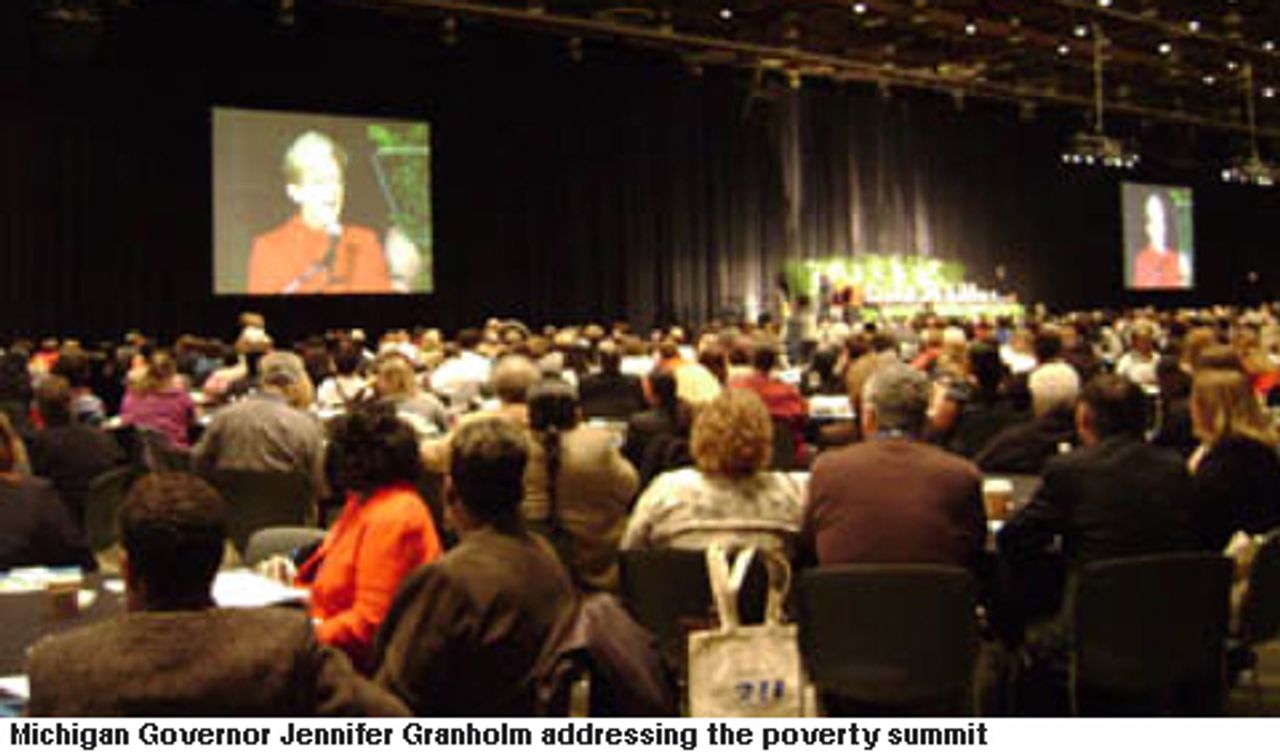A "poverty summit" was held at Detroit's Cobo Center on November 13. The "Voices for Action 2008 Poverty Summit" attracted thousands of social workers and representatives of charities from throughout the state of Michigan. It was hosted by the Michigan Department of Human Services, the non-profit Michigan Community Action Agency Association and the Governor's Commission on Community Action and Economic Opportunity.
 Michigan has suffered decades of deindustrialization and the attendant devastation of cities and towns. Now, in the midst of the current economic crisis, the working class in Michigan is facing a rapidly deteriorating situation, with job losses in the state's auto industry mounting and home foreclosures and evictions increasing. Social services and private charities have been swamped by the growing demand for relief.
Michigan has suffered decades of deindustrialization and the attendant devastation of cities and towns. Now, in the midst of the current economic crisis, the working class in Michigan is facing a rapidly deteriorating situation, with job losses in the state's auto industry mounting and home foreclosures and evictions increasing. Social services and private charities have been swamped by the growing demand for relief.
According to official figures released late last month, Michigan, at 8.7 percent, had the second highest unemployment rate in the US in September. The figure for October will undoubtedly be higher. Detroit, Michigan's largest city, is ranked as the poorest city in the country. There are 2 million people in the state living below the official poverty line, including 500,000 children.
Thursday's event demonstrated the lack of any serious policy on the part of the political establishment to address this social catastrophe. The "poverty summit" was little more than a public relations event designed to give the appearance that Michigan's Democratic Party politicians, including Governor Jennifer Granholm, are moving to address the problems confronting unemployed and low-wage workers. Granholm addressed the meeting after returning from a national media tour in which she sought to drum up support within the ruling elite for a bailout of the Big Three American automakers—General Motors, Ford and Chrysler—which will entail tens of thousands more layoffs and unprecedented attacks on auto workers' wages, health benefits and pensions.
Over the past three decades, the auto companies have extracted massive tax concessions from the state and from local governments, threatening to shut plants and move production to lower-wage regions if their demands were denied. The auto giants got their tax windfalls, and shut plants and slashed jobs anyway. The billions in tax cuts went to increase the wealth of big shareholders and Big Three executives, while basic services for the population, such as education, healthcare and housing, deteriorated.
Granholm and other speakers at the forum said nothing about this history or the corporations, banks and social interests that are responsible for the social decay. Not a single substantive measure was proposed to halt the epidemic of home foreclosures, utility shutoffs and layoffs. Instead, there was talk of token measures, such as mentoring for impoverished children.
 The event did attract thousands of people from all over the state who want to address the worsening social crisis. Among the attendees were many social workers and technical experts on questions related to poverty, housing and education. The World Socialist Web Site spoke with some of these participants.
The event did attract thousands of people from all over the state who want to address the worsening social crisis. Among the attendees were many social workers and technical experts on questions related to poverty, housing and education. The World Socialist Web Site spoke with some of these participants.
Donald Moore, a clinical therapist, said that the Detroit homeless shelter where he works is already witnessing the impact of the economic crisis. "We are seeing daily more people looking for shelter, and more and more cases of mental illness are being discovered," he said.
Bob Houston and Justin Williams are college students. Houston works as a social worker and Williams works at a homeless shelter. Williams said that the shelter where he works is seeing more and more people coming from the cold—not because they don't have a home, but because the utility companies have cut off their heat and electricity. Williams complained that the conference had not provided "any specific proposals, nothing concrete." Houston said that many of his college friends' fathers are losing their jobs at the auto companies, and that his graduating classmates are not finding work.
Alphonzo and John are two young workers in Detroit who are getting job training as construction workers with an organization called the Young Builders Association. They said that one of the biggest problems in Detroit is a lack of affordable housing. John has seen three neighbors foreclosed on in the past year.
Elizabeth, an employee of the Michigan State Housing Development agency, told the WSWS that there are 79,000 homeless persons in the state of Michigan. What's new, she said, is that 7 percent are homeless as a result of having their homes foreclosed.
Many of those in attendance were social service workers from small towns across the state. Bob Bodig, a Michigan Department of Human Services worker from Huron County, explained that in his area there has been an increase in poverty and unemployment. "The small farms are gone, the manufacturing is gone," he said. He told the WSWS that there are not enough resources to meet the needs of those confronted with utility shutoffs. "The elderly are hit very hard" by cutoffs, he said.
Lisa, a social worker from a small town near Flint, explained some of the difficulties small towns confront. "Many families are losing their jobs," she said. "There's a real need for assistance. People are losing their homes and are not able to provide for their families." She said many people in her area were without utilities due to shutoffs. When asked what these families do in the winter, she replied, "They go without heat."
Mark, a social worker from Houghton, on Michigan's Upper Peninsula, said that even before the current economic crisis began, the area was very poor. Many people don't have enough money for the bare necessities of life, he said. "People have to decide how they're going to spend their money," he explained. "Some hold back on food to pay the utilities."
He also expressed concern about nutrition. "Usually, we worry about the kids who go to bed with nothing in their belly, but there are also many children who go to bed with their bellies full of junk food because that's all their parents can afford."
In general, the social workers and volunteers with whom the WSWS spoke said that the single biggest problem is the lack of good-paying jobs. In terms of their own work, they spoke of the need for more resources. Many expressed anger over the fact that hundreds of billions of dollars are being handed over to the biggest banks, but nothing is being done to address the crisis confronting working and poor people.
Subscribe to the IWA-RFC Newsletter
Get email updates on workers’ struggles and a global perspective from the International Workers Alliance of Rank-and-File Committees.
